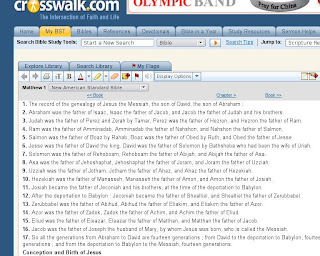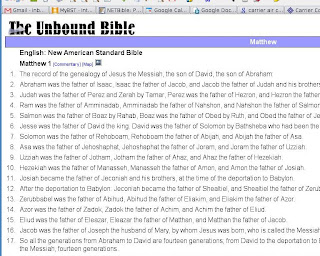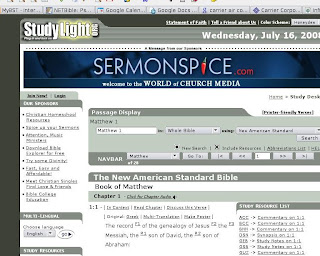
In the past, I've told you about some great online resources for studying the Bible and theology. For example,
The NET Bible (
http://bible.org) is one of my favorite sites (see also
http://net.bible.org). On this site, you can study various translations, get help with the original languages, sign up for self-paced lessons in theology, and read blogs by excellent theologians. This site is primarily related to the NET translation, but it also shows parallel translations. It is an excellent site for word studies and original language parsing. But there are a few more that I've been using that you might be interested in.
(Click on any of the images to see more detail.)

Crosswalk has a fairly good set of
Bible Study Tools (
http://beta.biblestudytools.com). There are many translations, original language helps, commentaries, Bible dictionaries, lexicons, devotionals, Bible-in-a-year reading plan, and so on. It's similar to net.bible.org in many ways, but you can choose which translation is your primary.
However, it doesn't have the theology program that the NET site does. One of best features of Crosswalk's site is that it allows you to highlight text and save personal notes for individual verses. The support for original languages is not bad, but for some reason, they are not offered in the parallel translations view.

Another similar site is the
eBible (
http://ebible.com). It is not as feature-rich as the other two sites, but I like the fact that the footnotes and cross-references are visible as "flyovers" - just put the mouse cursor over the footnote marker, and the footnote pops right up in a little, non-instrusive box. Most of the other sites require you to click on the footnote, and you are navigated away from the verse you were reading. This site also has a helpful tool for memorizing Scripture.

Biola University has a well-respected site called the
Unbound Bible (
http://unbound.biola.edu). It has a powerful search engine and a fantastic selection of translations in many languages. A minor downside of this site is that it is not quite as user-friendly and attractive as the others.
 Study Light
Study Light (
http://studylight.org) also does multiple translations and original language helps. The user interface is a bit constricted, but they have a unique offering of articles and other resources. They also offer more commentaries than most others, and they are easily accessible.

The
Bible Gateway (
http://biblegateway.com) offers plenty of punch, too, which a good selection of translations in many languages. The interface is simple, clean, and attractive, and it offers a nice set of tools and helps.

Also worth noting is the website offered by the publishers of the
ESV translation (
http://www.gnpcb.org/esv). They have a few devotions, an easy-to-use search engine, a daily reading plan, and some footnotes. This is a good site if the ESV is your translation of choice, but the ESV is also available on some of these other websites with all the tools (such as eBible, Bible Gateway, Study Light
Almost all of the sites offer a similar library of dictionaries and maps, although each site has something unique in its library. Many offer audio versions of the passage you're reading - just click and you hear the passage read. The major difference will be a matter of taste - try them all and see which you like best. Some sites do not offer key translations, such as the NASB, the NET, and the ESV. If you want to do any study related to the original languages, some of these sites offer something, but few offer something excellent.

There is, however, one notable exception. It is very good for Greek (no Hebrew), but it doesn't offer all of the other bells and whistles. And I love the name -
The Resurgence Greek Project (
http://www.zhubert.com). It does parallel translations and has excellent flyover analysis of Greek words, including parsing the grammar. This is a Bible nerd's haven! There are some Hebrew sites, but they still have a lot to be desired on presentation.

One more fun site - it's not for Bibles, but for background and general Bible study, called the
OpenBible.info (
http://openbible.info). It has a great set of maps and photos (using Google Earth!) - you can find exactly what you want very easily. You can download Google Earth kmz files and have on your desktop all the identifiable biblical sites -
this is very, very cool! It has a topical Bible "mashup" - a strong search engine on words and topics, a very cool Bible book browser, and some interesting tools that make visual images based on words of the Bible. This site uses the ESV exclusively.
If you have another website you like to use for Bible study and theology, I want to know. I'm always looking for a site that offers something new and unique!
Also note that there are several very good programs that you install on your computer (Libronix, e-Sword, WordSearch, and so on). They cost money, but the features can't be beat and the available selection of books far exceed the free online tools.











